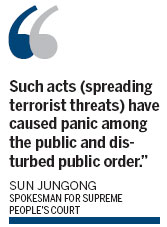Crackdown on hoax terror threats
Updated: 2013-09-30 08:05
By Zhao Yinan and Cui Jia (China Daily)
|
||||||||
Court clarifies term for false info that has 'serious consequences'
Those convicted of fabricating false rumors of terrorist threats or natural disasters will be sentenced to at least five years in prison if the consequences are deemed serious, a spokesman for the Supreme People's Court said on Sunday.
"Over the past few years, China has seen many cases of terrorist threats being invented for the purposes of blackmail, taking revenge or just for fun. Such acts have caused panic among the public and disturbed public order," said Sun Jungong, spokesman for the Supreme People's Court, during a news briefing.
The court published an explanation last week on how such cases will be dealt with in future.
Lyu Guanglun, a judge at the Supreme People's Court, said Chinese airlines and airports had received more than 80 false terrorist threats by September, since the authorities started to collect such data.
Between May 15 and 18, six fake bomb threats were reported nationwide and 22 flights were forced to turn back, land elsewhere or be delayed, causing harm to both the airlines and the passengers.
Shenzhen Airlines suffered direct losses of more than 170,000 yuan ($27,700) after receiving a fake bomb threat on a flight from Xiangyang, Hubei province, to Shenzhen, Guangdong province, on Aug 30, 2012. The airline dispatched two aircraft to transport the stranded passengers.
Police later arrested the culprit, who was sentenced to four years in prison.
China's criminal law stipulates that those who fabricate and spread terrorist-related rumors face criminal charges if they severely disturb social order or cause severe consequences.
But Sun said the clause fails to spell out what kind of illegal behavior can be identified as "severely disturbing social order" and what are considered "severe consequences".

According to the explanation, the following situations could be categorized as severe public disorder if a threat:
causes an airport, train station, shopping center or cinema to be evacuated;
disturbs operations of aircraft, trains or ferries;
interrupts activities of schools, hospitals or government offices;
causes chaos in villages or communities or forces public security forces, armed police or fire departments to launch emergency plans.
People who are responsible for any of these consequences will face criminal charges.
The explanation says consequences could be classified as severe if a threat:
causes injuries to three people or one severe injury;
causes economic losses of 500,000 yuan or more;
impedes major State events;
causes severe social disorder in a county or a higher level of administrative region.
In cases where the illegal behavior does not lead to a severe consequence, offenders will be sentenced to jail terms of less than five years, the explanation has ruled.
Sun said one of the highlights in the explanation is that people fabricating terrorist threats must be held accountable once the information is disseminated, no matter whether they spread the information themselves. Those who pass on the information will also be punished if found guilty.
Liu Xiaoyuan, a Beijing lawyer, said the explanation aims to deal with spreading false terrorist threats on the Internet.
"People will be charged for making up or forwarding such information online or through social networking sites. But if one posts such information online and then removes it before it spreads, he won't be charged," he said.
Chen Xin, an employee at a Beijing pharmaceutical company, said the new regulation is necessary since fake airplane bomb threats can waste time and cause economic losses to passengers, airline companies and public security authorities.
When Chen encountered a fake bomb threat in May on a business trip to Shenzhen, he said the whole day was wasted due to flight delays and he had to reschedule the trip.
"The plane didn't take off after the door was closed for a long time. At first we didn't know what had happened, until all the passengers were asked to get off and go through the security check again. As I descended, I saw about 100 police officers waiting on the apron, all fully armed. Then I realized what was going on," he said.
Contact the writers at zhaoyinan@chinadaily.com.cn and cuijia@chinadaily.com.cn
(China Daily USA 09/30/2013 page4)

 National Day holidays around the world
National Day holidays around the world
 Martial arts to attract golden week tourists
Martial arts to attract golden week tourists
 Investing a nation's wealth wisely
Investing a nation's wealth wisely
 This China Dream
This China Dream
 Williams, Li into second round at China Open
Williams, Li into second round at China Open
 Visible face of CIC investment
Visible face of CIC investment
 Up, up, Huawei finds new friends in Europe nations
Up, up, Huawei finds new friends in Europe nations
 Yuxi to shield Fuxian Lake by creating wetland area
Yuxi to shield Fuxian Lake by creating wetland area
Most Viewed
Editor's Picks

|

|

|

|

|

|
Today's Top News
China issues guidance for government purchases
China calls on APEC to promote FTA integration
Japan, US kicks off 2nd round of TPP-related talks
Website launched to assist expat professionals
Shanghai opens free trade zone
50 foreign experts honored with Friendship Awards
Academic warns Obama on Pacific policy
US Confucius Institutes gather
US Weekly

|

|







